"Think of exercise as medication,” says John Ratey, M.D., an associate clinical professor of psychiatry at Harvard Medical School. “For a very small handful of people with attention deficit hyperactivity disorder (ADHD ADD), it may actually be a replacement for stimulants, but, for most, it’s complementary — something they should absolutely do, along with taking meds, to help increase attention and improve mood.”
While most of us focus on exercise as a way to trim our waistlines, the better news is that routine physical activity firms up the brain -- making it a simple, alternative ADHD treatment. “Exercise turns on the attention system, the so-called executive functions — sequencing, working memory, prioritizing, inhibiting, and sustaining attention,” says Ratey, author of the forthcoming Spark: The Revolutionary New Science of Exercise and the Brain (Little, Brown). “On a practical level, it causes kids to be less impulsive, which makes them more primed to learn.”
The latest news about exercise is that it helps kids push through past failures and attack things they didn’t succeed at before. “The refrain of many ADHD kids is, ‘No matter what I do, I’m going to fail,’” says Ratey. “Rat studies show that exercise reduces learned helplessness. In fact, if you’re aerobically fit, the less likely you are to learn helplessness.”
So how, exactly, does exercise deliver these benefits to the ADHD brain? When you walk, run, or do a set of jumping jacks or pushups, your brain releases several important chemicals.
Endorphins, for one, hormone-like compounds that regulate mood, pleasure, and pain. That same burst of activity also elevates the brain’s dopamine, norepinephrine, and serotonin levels. These brain chemicals affect focus and attention, which are in short supply in those with ADHD. “When you increase dopamine levels, you increase the attention system’s ability to be regular and consistent, which has many good effects,” explains Ratey, like reducing the craving for new stimuli and increasing alertness.
You don’t have to be a marathoner, or even a runner, to derive benefits from exercise. Walking for 30 minutes, four times a week, will do the trick. “Get your child involved in something that he finds fun, so he will stick with it,” suggests Ratey. Team activities or exercise with a social component are especially beneficial.
Studies have also found that tae kwon do, ballet, and gymnastics, in which you have to pay close attention to body movements, tax the attention system. “A very good thing for kids and adolescents with ADHD,” says Ratey.
More schools are including exercise in their curricula to help kids do better in the classroom. A school in Colorado starts off students’ days with 20 minutes of aerobic exercise to increase alertness. If they act up in class, they aren’t given time-outs but time-ins — 10 minutes of activity on a stationary bike or an elliptical trainer. “The result is that kids realize they can regulate their mood and attention through exercise,” says Ratey. “That’s empowering.”

This article is excerpted from a Special Report: Beyond Meds, about five popular complementary approaches for ADHD, which appeared in the December/January 2008 issue of ADDitude.
Order the back issue to read the entire report, and SUBSCRIBE NOW to ensure you don't miss another issue!




